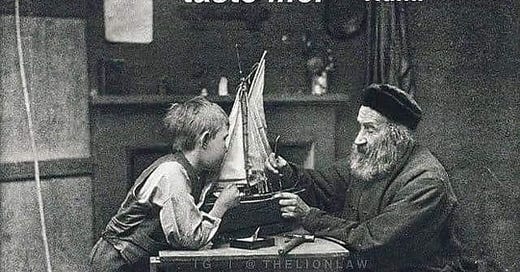I am reminded of a story, or rather fable, that I learned a long time ago. It takes place on a beach in Mexico, on the shore of a tiny community not even big enough to be called a town. It’s a little after dawn and a fisherman moves the day’s catch into a dinghy and rows ashore. He is met by a foreigner (Modern American, of course), who asks him what he will do with the fish. “I’ll take them to the market in the Plaza, and a cousin of mine will sell them” he replied.
The American frowned, and said, “You don’t have a business then?”
“No, this is all I need”, the fisherman replied.
“Let me help you start a business,” the Modern man exclaimed. “You’ll be able to hire help, sell your fish in many markets including in the U.S., and after many years you’ll have enough money saved to retire and not have to work; you’ll be able to spend your retirement with your family.”
The fisherman got back to the work of moving the fish to the back of a battered pick-up truck, without a word. The man once more implored, “Don’t you want to have a good retirement?”
The fisherman turned, smiled, and said, “I love being on the water before dawn. It’s like a meditation for me, communing with Nature and the water, the sea life, praying that I only catch the fish that are willing to feed my family and friends. The income I get may seem small to you, but it’s enough for my family and relatives, as we don’t need much. After these are delivered to my cousin, I’ll go home and spend the rest of my day with my family. I don’t need to work more than this, I’m already retired.”
You see, friends, Modern is anything but simple. Wild is simple. Modern has successfully captured our imagination to such a degree that we fail to see, cannot remember, that joy lies in connection and creativity, in art and music and conversation about spiritual growth and wisdom. Modern may have gotten its start as human communities grew to need specialization in order to feed everyone, especially once we turned to farming and storing food rather than eating what Nature provides in a natural rhythm. Modern depends on storage out of fear of scarcity; Wild knows from experience that nature is enough, especially in the absence of fear and greed.
“A human being should be able to change a diaper, plan an invasion, butcher a hog, conn a ship, design a building, write a sonnet, balance accounts, build a wall, set a bone, comfort the dying, take orders, give orders, cooperate, act alone, solve equations, analyze a new problem, pitch manure, program a computer, cook a tasty meal, fight efficiently, die gallantly. Specialization is for insects.”
― Robert A. Heinlein
Modern tells us all: go to university, get married, get a job, have kids, and you are a success. But for most of us, this leaves a hollow or rotten center in our being. We don’t feel fulfilled, we don’t recognize we have a purpose; we are quiet in our desperation. And then we die. I’ve not heard of anyone saying, with their last dying breath, ‘I should have bought the Chevy not the Ford’. Seen from that vantage point, what would you want to focus on with your last breath? Seriously…if this a not a question you have asked yourself, please do.
Those who were unofficial leaders during our Wild ancestry were like the description above. They would leave their tribe once it grew too large, move a few valleys over, and continue (and grow) a community with the toolbox of skills they had mastered. No one told them to go, they weren’t elected, they were respected for their wisdom and they knew (possibly from hard experience) what it took for a tribe to survive. They weren’t specialists, they had no MBAs. Respect is earned by being useful, caring, and loving. It is lost by being greedy, hateful, and angry….and self-focused to the exclusion of others. Wild leads us to respect ourselves. Let’s go Wild.




Your story (which I had heard long ago) reminded me of a "corollary" example I read or heard in the recent past:
A real estate agent sells property during the week so he/she can fish and hunt on weekends. But would someone who hunts and fishes during the week pass their weekends selling property?
I like how both stories (parables?) give some perspective on what we've become and the ironies of the fruits of modernity and progress.